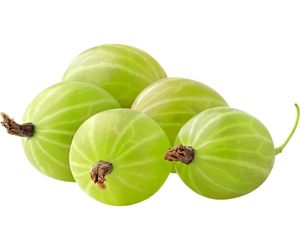Some berries are safe for dogs, but when we specifically discuss gooseberries. Gooseberries are not safe for dogs. These are toxic and, when consumed, cause health-related problems to dogs.
For a better understanding of whether dogs can have gooseberries or not let’s learn more.
What is a gooseberry?

A gooseberry is a type of berry with edible fruit. They belonged to the genus Ribes and were previously known as acid gooseberries. These are small gelatinous fruits that are eaten whole for their flavor. They are a type of black currant. Not to be confused with the plant’s common name, “black currant.”
However, talking about appearance, these have short, hairy branches which grow in whorls of 3 or 4. The whorls are covered primarily with thorns, in contrast to the smooth bark on the main stem. Additionally, one feature that sets gooseberries apart from other bramble relatives is their ability to lie on their stems without spreading their thorns.
When you explore the market for different gooseberries, you will see that they are available in different colors, including red, yellow, pink, green, and purple.
Can dogs eat gooseberries?
Gooseberries are not safe for dogs. These are toxic, and if a dog has consumed them, they will ultimately suffer from some gastrointestinal issues and other problems. However, some dogs may like the taste of gooseberries as they are slightly acidic, but do know that even if they like the taste, it is not advisable to feed them gooseberries.
What are the complications a dog may suffer after consuming gooseberries?
The possible complications that a dog may suffer after consuming gooseberries are as follows:
- Vomiting
- Lethargy
- exhibit signs of diarrhea.
- Seizures
- Drooling excessively
- Trouble breathing or wheezing?
Note: If you know that your dog has consumed gooseberries and that’s why they are going through a certain condition, do not wait to bring your canine to the vet. Ignoring these potential symptoms can sometimes put a dog at risk of developing other symptoms.
Can I feed my dog unripe gooseberries?
Unripe gooseberries are not safe for any living being, and these are also supposed to be processed in order to prepare the final product for which they are harvested. If you are feeding your dog these unripe gooseberries, they are more likely to suffer from different health-related conditions.
Do dogs like gooseberries?
Like humans, dogs are also certain of the food they want to consume. Some dog breeds like the slightly sour taste of gooseberries. If you have a dog breed that likes this taste, you can go for it. However, even if your dog enjoys the taste, if they develop any health problems due to its consumption, contact your veterinarian right away.
What is the potential risk to dogs if they consume gooseberries?
If your dog is consuming gooseberries, you should know there are more chances for them to suffer from gastric issues. There are some other problems too that they may experience.
How often can I feed my dog with gooseberries?
Well, not even in small quantities, it is recommended to feed your dog gooseberries. It is responsible for causing immediate health-related problems that no canine owner wants their canine to suffer with.
Can I feed my dog with cape gooseberries?

Cape berries are highly toxic, hence not a suitable edible item for dogs. Whether you choose the ripened or unripened fruit, both are not for dogs.
Is it safe to feed a dog with Indian gooseberries?
Indian gooseberries are also not safe for dogs. However, there is no scientific evidence claiming that these are harmful to dogs, but as they belong to the same family, so it is not advisable for dogs.
What we learned from all this
Gooseberries are not a safe option for dogs in any case. Even if your dog enjoys the taste of gooseberries, you should not feed them to them. If you don’t avoid it, your dog is likely to suffer from various health problems. Furthermore, in some cases, dogs also develop skin allergies after consuming it. In that case, there are some skin tests the vet will conduct to check your dog. Thus, don’t be late to reach the vet. Also, always choose dog safe food.
